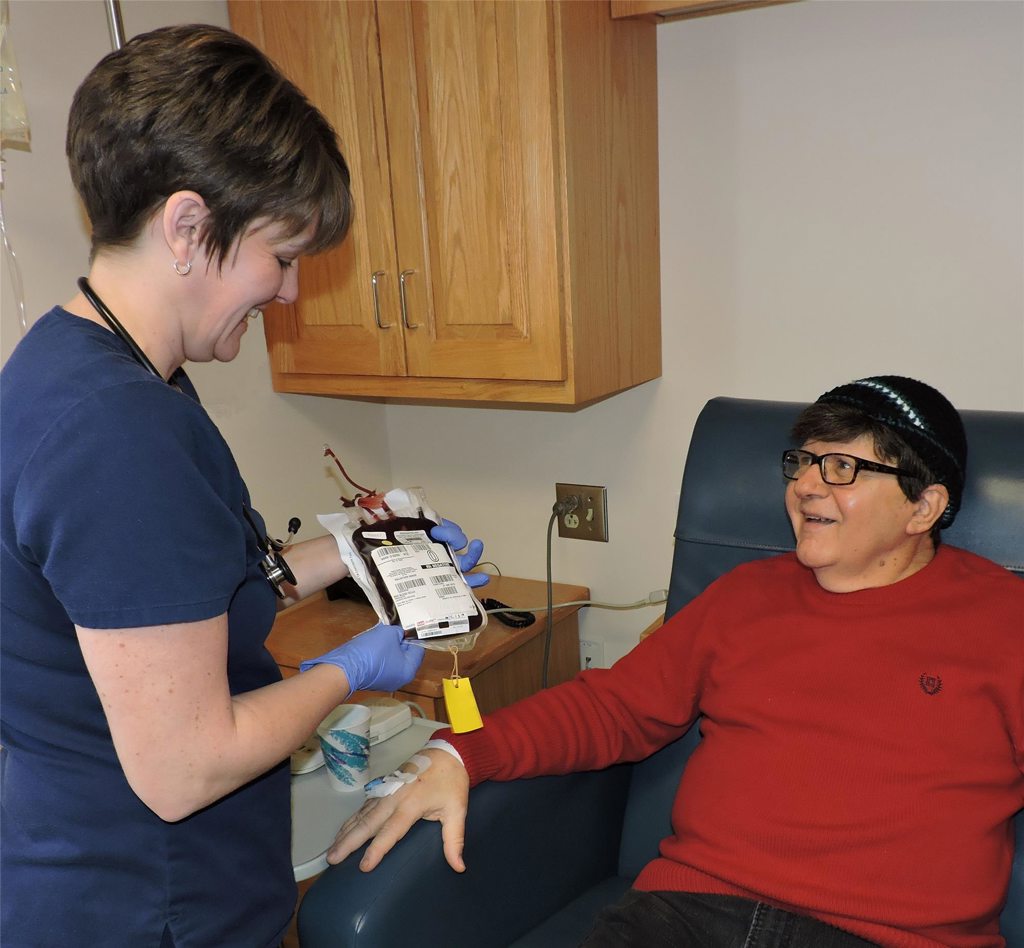
January is National Blood Donor Month
If you are healthy and well, it is hard to imagine that what is flowing through your veins can be needed by another person. But as January is National Blood Donor Month, let’s remember that blood donation is vital for so many.
“It has been a lifesaver for me,” Raymond Vitello of DuBois said about the blood transfusion that he receives periodically. When his red cells are low due to his blood cancer diagnosis, Vitello is given a pint of whole blood in the Short Stay Unit at Penn Highlands DuBois.
All four Penn Highlands Healthcare hospitals provide blood transfusions for patients regularly. Blood transfusions are common place in hospitals for patients who need blood to combat illnesses and diseases that deplete their systems, such as cancer.
“Maintaining normal blood cell counts during cancer treatment is necessary for the patient to continue treatment for their cancer,” according to Tracey Sayers, BSN, RN, OCN, director of Oncology Nursing at Penn Highlands Healthcare. “If blood levels drop too low, then a patient may have a delay in their treatment. A blood transfusion can help the cancer patient maintain blood levels necessary to continue their scheduled treatments. Staying on schedule can improve the patient’s response to treatment.”
“Patients who undergo cancer treatments often suffer from weakness and fatigue. These side effects can be worsened as a result of low blood cell counts. Replacing these blood products will boost the blood cell count and the hopeful response is a boost to the patient’s energy level,” Sayers said.
“Blood transfusions may also be needed for cancer patients who are not currently on treatment,” she added. “Their cancer may affect their blood cell production. Transfusions are needed for these patients so they are able to perform their daily activities and maintain their quality of life.”
For Vitello, blood cells are directly affected by his type of cancer. The cancer cells may crowd out normal blood-making cells, leading to low blood counts. Receiving the blood product can bring the blood cells back to a healthier count allowing him to continue with the treatments he needs.
“I am lucky to have the blood that’s donated,” Vitello said. Since September, he has received at least one if not two units of blood monthly. His blood cells are monitored by his healthcare providers at Hahne Regional Cancer Center. How often he receives blood depends upon how low it is when tested, but he can usually tell when his red cells are low as he gets really tired and has shortness of breath.
After a transfusion, Vitello can feel the difference immediately. “It takes a day or two to get more energy,” he said. The red cells bring his body the oxygen that it needs.
It’s for patients like Vitello that Penn Highlands Healthcare encourages blood donation. Penn Highlands has partnered with only one blood supplier for its four hospitals – Community Blood Bank, or CBB – to host their own blood drives through CBB and support others to do the same.
“The Community Blood Bank is proud and grateful to be the exclusive blood supplier to the entire Penn Highlands Healthcare system,” Jaclyn Seymour, community relations specialist of CBB, said. “When an accident, trauma or illness occurs, we want to make sure the blood supply is there for you or your loved ones when they need it. Therefore, it’s important to donate blood with the Community Blood Bank.”
“Our model relies on the blood donor residents in each community to support the blood needs of their area hospitals,” says Deanna Renaud, executive director. “We are eager to partner with local schools, businesses and organizations so that the blood donors here have the opportunity to give for their own local blood supply.”
And that is true. Blood products cannot be created artificially. “It takes everyone in the community to keep our blood supplies at optimum levels,” Marshal Uhl, service line director for Laboratory Services at Penn Highlands Healthcare, said. Anyone in general good health, over age 16 and over 110 pounds can come out to donate every 56 days.
“It’s helped me,” Vitello said. “If you can do it, I don’t see any reason why not donate. It’s a lifesaver for patients like me. If it wasn’t there, I don’t know what I would do…It’s a good thing for yourself and the person you are giving to. You are helping someone in the community who really needs the blood.”
For the region, CBB has the following blood drives scheduled for the next few months:
- Tuesday, Feb. 5, from 1-7 p.m. at the Treasure Lake Church, DuBois;
- Tuesday, Feb. 5, from 11 a.m. to 4 p.m. in the Education Center at Penn Highlands Elk;
- Tuesday, Feb. 19, from 10 a.m. to 2:30 p.m. at Education Conference Center at Penn Highlands Brookville;
- Wednesday, Feb. 20, from 2:30-5:30 p.m. at the Clarion Medicine Office, Clarion.
- Tuesday, March 5, from 10 a.m. to 3:30 p.m. in the Central Resource Center at Penn Highlands DuBois West;
- Tuesday, March 5, from 11 a.m. to 4 p.m., in the Education Center at PH Elk;
- Wednesday, March 13, from 1-5 p.m. in the Nathaniel D. Yingling, MD, Cancer Center at Penn Highlands Clearfield.
A schedule is also available at www.fourhearts.org. Anyone interested in hosting a CBB drive can contact Kathy Hastings, regional mobile drive coordinator for CBB, at 716-450-0376 or [email protected].
